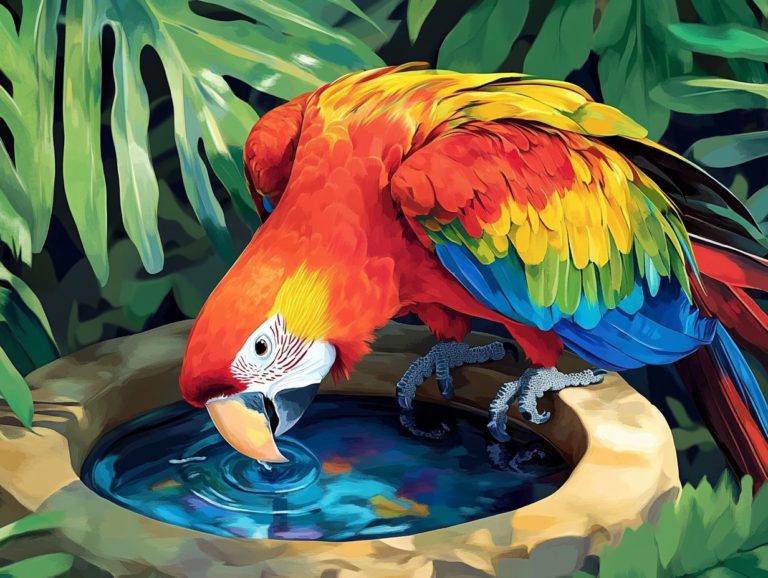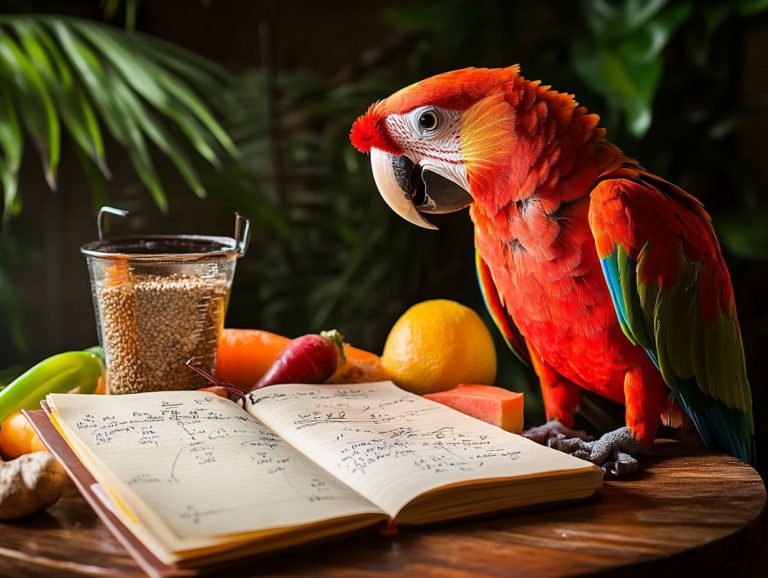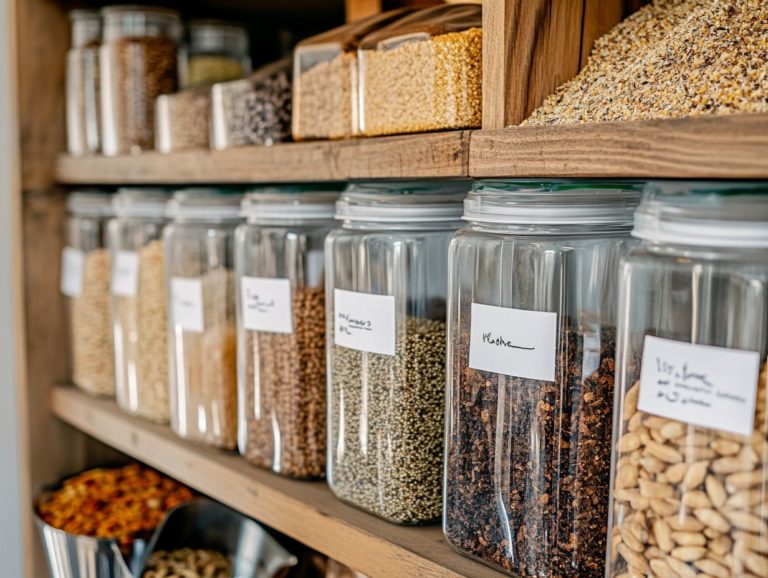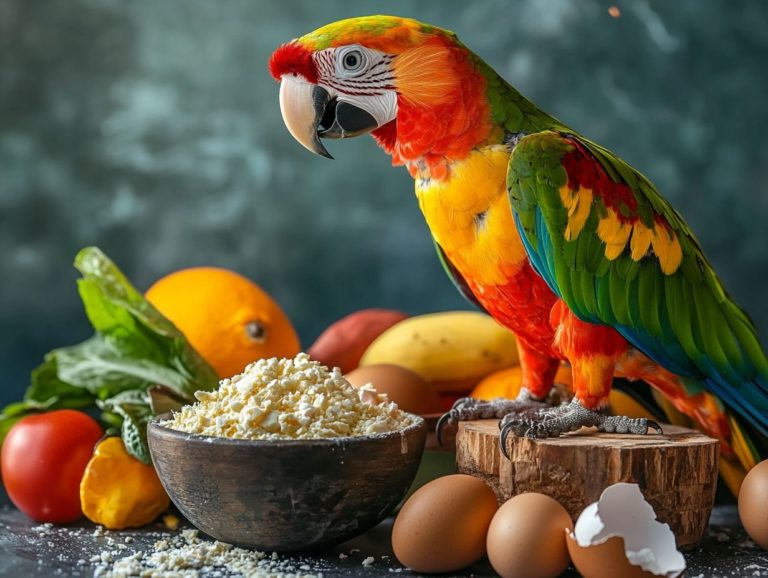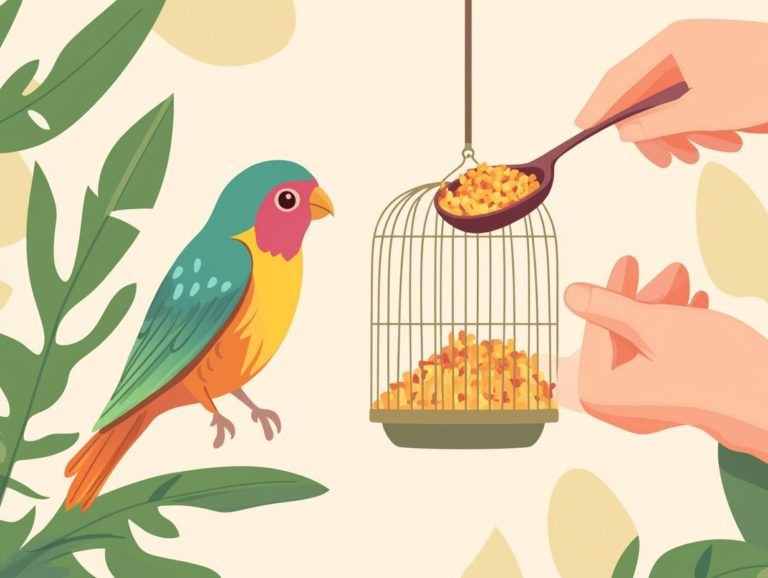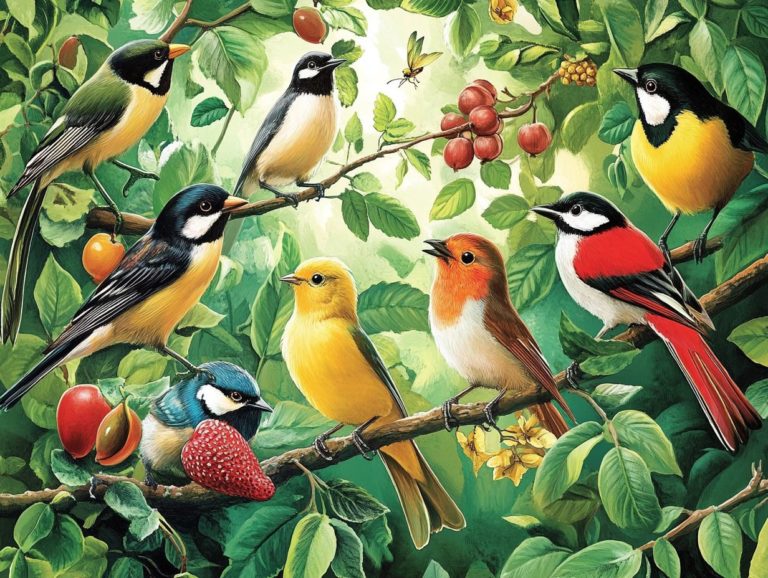5 Best Feeding Practices for Pet Birds
Feeding your pet bird goes beyond simply filling a bowl; it s crucial for their health and happiness.
With many options available, understanding the best feeding practices can significantly impact your feathered friend s well-being. Get ready to discover essential tips that will keep your bird thriving, from offering a balanced diet to monitoring their weight.
You ll explore safe and unsafe foods, learn how dietary needs change with age, and discover the best practices tailored to various bird species.
Let s transform your bird s diet today! Dive in!
Contents
- Key Takeaways:
- 1. Provide a Balanced and Varied Diet
- 2. Offer Fresh Water at All Times
- 3. Limit Treats and Table Scraps
- 4. Feed at Consistent Times
- 5. Monitor Food Intake and Weight
- What Foods Are Safe and Healthy for Pet Birds?
- How Can Feeding Habits Affect a Bird’s Health?
- What Are the Signs of a Poor Diet in Birds?
- How Can a Bird’s Diet Change as They Age?
- What Are the Best Feeding Practices for Specific Bird Species?
- Frequently Asked Questions
- What are the 5 best feeding practices for pet birds?
- Why is it important to provide a varied diet for pet birds?
- How often should fresh foods be offered to pet birds?
- Why is it necessary to monitor portion sizes for pet birds?
- What type of clean water should be provided for pet birds?
- Which foods should be avoided when feeding pet birds?
Key Takeaways:
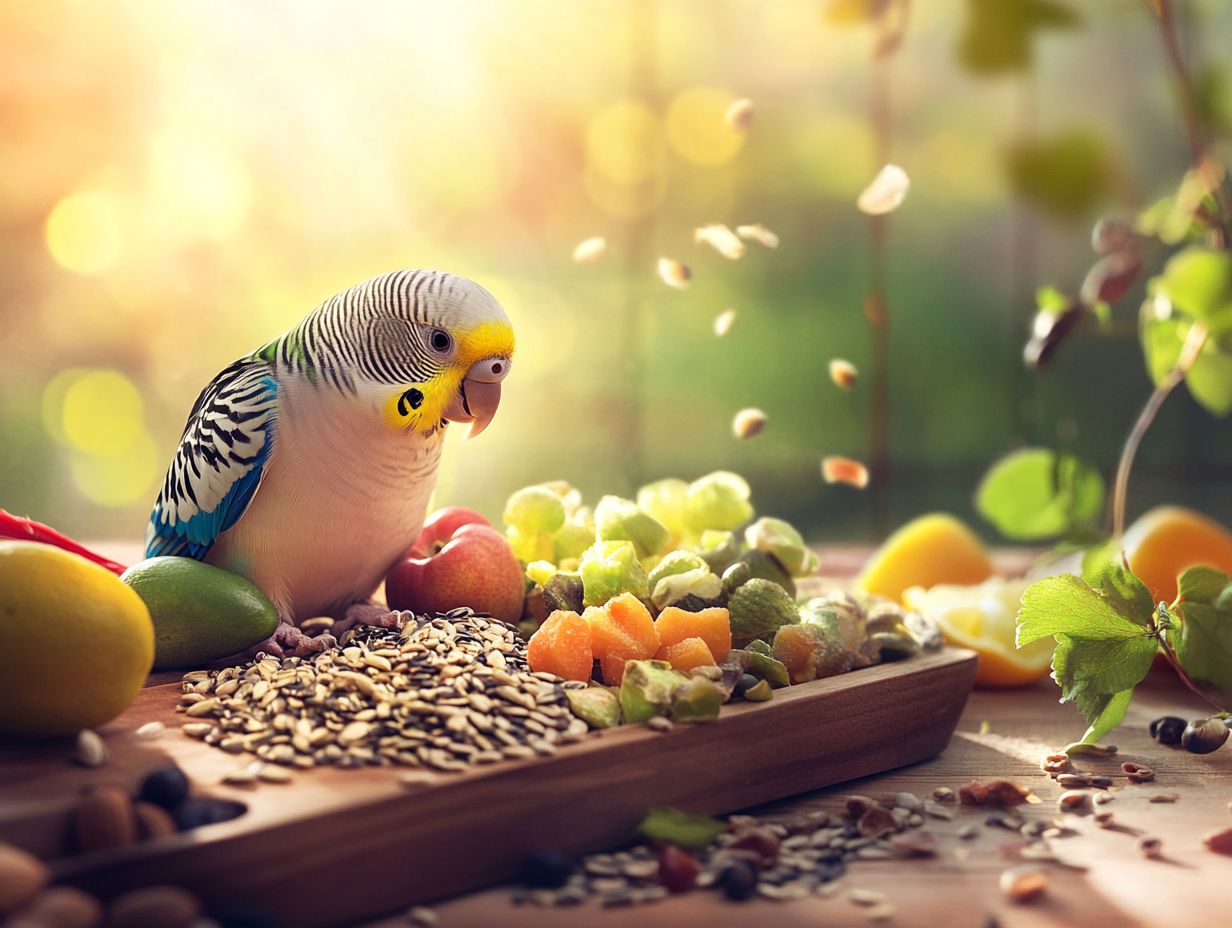
- Provide a balanced and varied diet to ensure your pet bird receives all necessary nutrients.
- Always have fresh water available for your bird and monitor their food intake and weight.
- Limit treats and table scraps to prevent obesity and health issues in pet birds.
1. Provide a Balanced and Varied Diet
Providing a balanced and varied diet for your pet birds is vital for their health and well-being. It ensures they receive all essential nutrients needed for growth, immune function, and longevity, including vitamins, minerals, and protein sources for pet birds that cater to their unique dietary needs.
To achieve this, combine high-quality pelleted diets, like Harrison s and Kaytee, with fresh fruits, vegetables, and grains. Pelleted diets often provide a complete nutritional profile, ensuring your birds get a consistent daily intake of vitamins and minerals.
Adding fresh foods like leafy greens, berries, and bell peppers enriches their diet with essential antioxidants and hydration. Neglecting these dietary components can lead to severe deficiencies, resulting in issues like feather plucking and weakened immune systems.
2. Offer Fresh Water at All Times
Providing fresh water at all times is vital for the hydration and health of your pet birds, directly influencing their overall well-being and supporting the digestion of their varied diets.
Proper hydration supports body processes and ensures optimal organ function in avian species. Water plays a crucial role in digesting food, helping with nutrient absorption, and regulating body temperature.
Make it a habit to refresh their water supply daily and use clean containers to prevent harmful bacteria. Consider setting up multiple drinking stations in their environment; this encourages regular access and promotes consistent consumption.
By prioritizing clean, fresh water, you can significantly enhance your pets’ vitality and longevity, ensuring they thrive in your care.
3. Limit Treats and Table Scraps
Limiting treats and table scraps for your pet birds is crucial to prevent obesity and ensure their diets focus on nutrient-rich foods necessary for long-term health.
Overindulging in these extras can lead to excess weight and a range of health problems, including heart disease and liver issues. Many human foods also include ingredients unsuitable for birds, complicating their nutritional balance.
Instead, consider healthier alternatives like small pieces of fresh fruits, vegetables, or specially formulated bird treats that provide essential vitamins and minerals. These choices not only satisfy your birds cravings but also promote their overall health and well-being, while avoiding the pitfalls of overfeeding.
4. Feed at Consistent Times
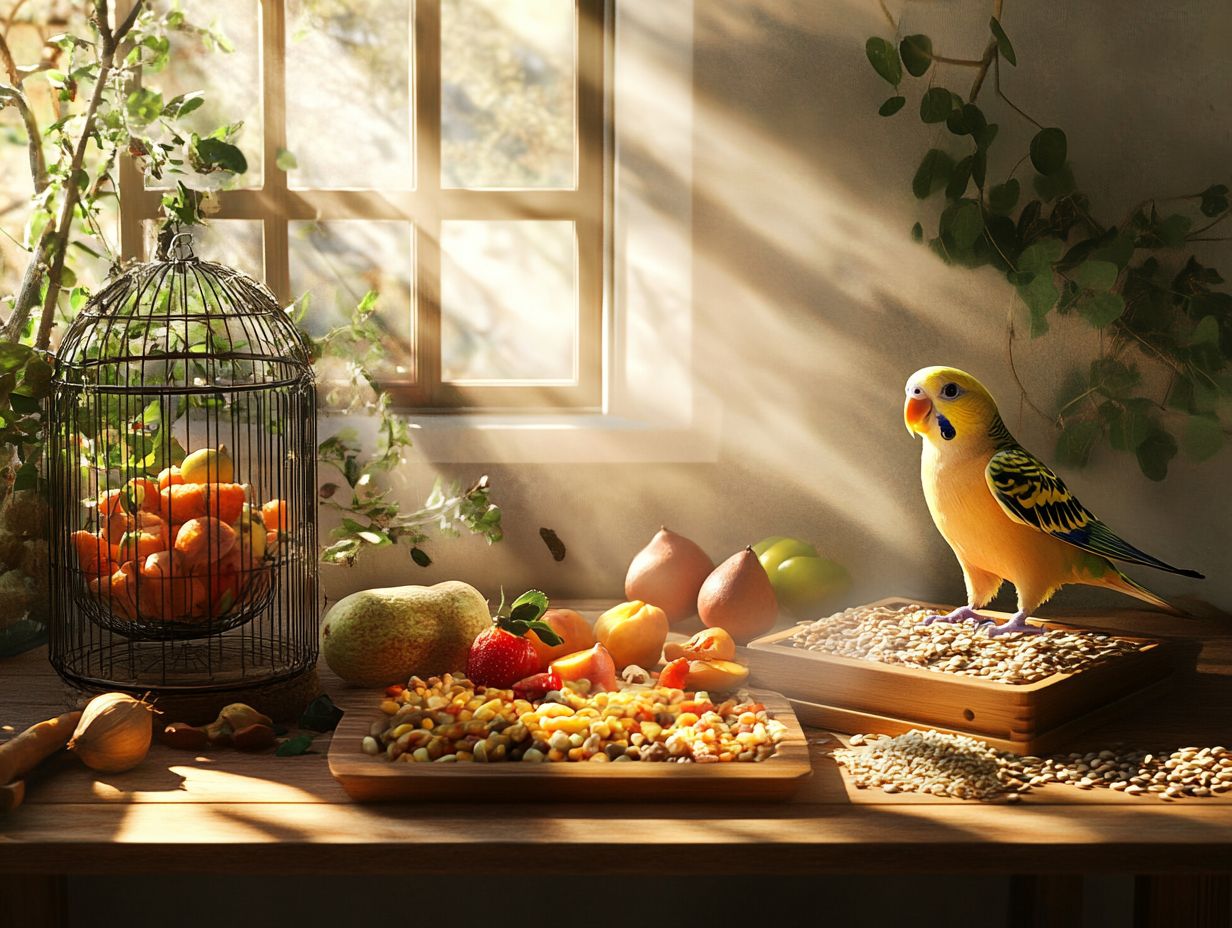
Feeding your pet birds at consistent times each day greatly contributes to their overall well-being. Establishing a routine helps regulate the way their body uses food for energy and fosters a healthy relationship with food. You can also explore creative ways to feed your bird to make mealtime more engaging.
This regular schedule supports digestive health and significantly alleviates anxiety. Birds flourish in environments where they feel secure. When your feathered companions know what to expect, their stress levels drop, resulting in more balanced and playful behavior.
A structured feeding schedule can enhance their overall health by preventing overindulgence and ensuring they receive essential nutrients at the right times. Incorporating the 5 best practices for budgerigar health will help your birds become more sociable and display a wider range of natural behaviors, ultimately enriching their quality of life and strengthening the bond they share with you.
5. Monitor Food Intake and Weight
Monitoring your pet bird’s food intake and weight is an important practice for spotting potential health issues early. It allows you to make timely dietary adjustments that can prevent obesity and a host of other health problems.
Keep a careful record of their daily food consumption and conduct regular weigh-ins to gain invaluable insights into your avian companion s health. This attentive approach helps you identify early signs of obesity like a reluctance to fly or noticeable changes in body shape and gives you the power to tailor diets to meet the specific requirements of different bird species.
For example, adjusting portion sizes and providing a balanced blend of seeds, fruits, and vegetables can significantly impact weight management. Being aware of each species nutritional needs ensures that your birds receive the necessary vitamins and minerals for their overall well-being.
What Foods Are Safe and Healthy for Pet Birds?
Do you know which foods are safe and healthy for your pet birds? Let s explore! Understanding which foods to incorporate is essential for providing them with a balanced diet.
You ll want to include a variety of fresh foods, fruits, and vegetables that deliver the necessary vitamins, minerals, and protein they need to thrive. A diverse diet not only helps prevent nutritional deficiencies but also keeps these intelligent creatures mentally stimulated and eager to explore their meals.
Here are some safe options to consider:
- Leafy greens like kale and spinach
- Colorful bell peppers
- Fruits such as apples, bananas, and berries
In addition to fresh produce, high-quality pelleted diets can serve as a solid foundation. Adding dietary supplements like calcium and vitamin D3 can enhance their overall health. Variety is crucial; it mimics their natural foraging behavior, encouraging your birds to engage with their food and promoting optimal well-being.
What Foods Should Be Avoided for Pet Birds?
There are certain foods you must strictly avoid for your pet birds, such as avocado and chocolate, because they can lead to severe health issues and potentially be fatal if ingested.
These items harbor compounds that are highly toxic to avian species. For example, the persin found in avocado can trigger respiratory distress and fluid buildup in birds, while the theobromine in chocolate can result in cardiac problems and nervous system disturbances.
Even seemingly harmless foods like garlic and onions can upset their gastrointestinal systems and lead to serious organ damage.
Simple items, such as fruit seeds or the pits of stone fruits, are also hazards; they contain harmful substances that can release poison when metabolized.
Thus, it s essential for you, as a bird owner, to be informed and vigilant about your feathered friends’ diets. Be proactive about your pet birds’ diets to ensure they live a long and happy life!
How Can Feeding Habits Affect a Bird’s Health?
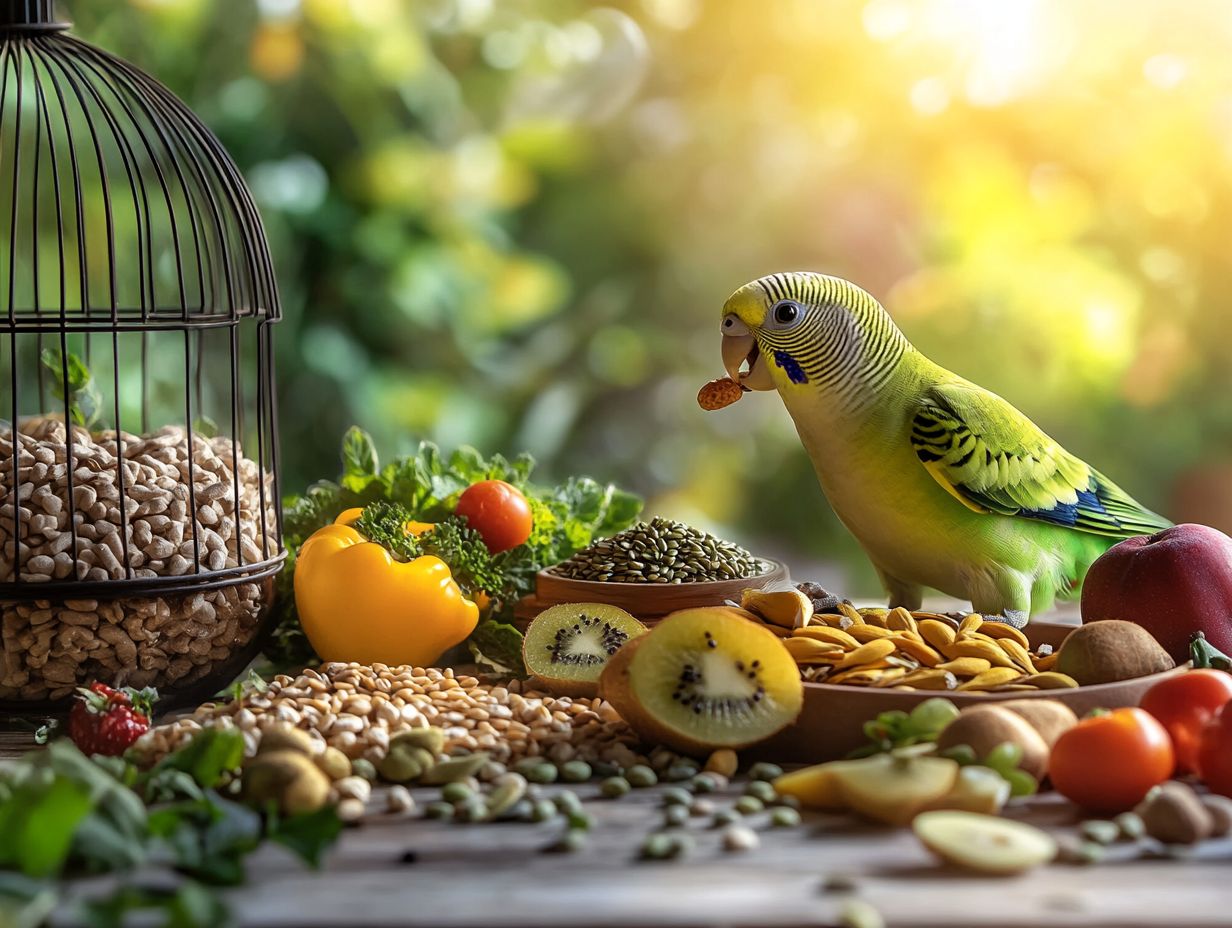
Feeding habits are vital to a bird’s health. To ensure they receive proper nutrition, consider following 5 essential care tips for newly adopted birds. Improper nutrition can lead to not getting enough vitamins, obesity, and various health issues that diminish their quality of life.
You must appreciate the importance of diet composition and portion sizes to maintain your feathered companions’ well-being. A balanced diet that includes seeds, pellets, fruits, and vegetables provides essential nutrients. Additionally, knowing the best time to feed your pet bird can help ensure proper portion sizes, preventing overfeeding and promoting healthy eating behaviors.
Varying their diet helps ensure your pets receive a broader spectrum of vitamins and minerals. This enhances their immune systems and energy levels. By prioritizing proper feeding practices, you can cultivate longevity and vibrancy in your avian friends.
What Are the Signs of a Poor Diet in Birds?
Recognizing the signs of a poor diet in birds is crucial for your feathered friends’ well-being. Symptoms like deteriorating feather quality, lethargy, and signs of not getting enough vitamins can serve as red flags.
These subtle yet alarming signs are often easy to overlook. Act quickly; otherwise, they can lead to more severe health issues. You might notice changes in behavior, such as increased irritability or a decrease in vocalization, hinting at nutritional inadequacies. Weight loss, fluffed-up feathers, and unusual droppings are all signals that something isn t quite right.
Acting quickly can save your bird’s life! Timely interventions are essential, as improper nutrition can lead to long-term health problems, including organ damage and weakened immune systems. By being vigilant and identifying these early warning signs, you can help ensure your avian companions stay healthy, vibrant, and full of life.
How Can a Bird’s Diet Change as They Age?
A bird s diet may need adjustments as it ages, reflecting changes in nutritional needs, activity levels, and potential health issues that become more pronounced over time.
As these avian companions progress through different life stages, their bodies may demand specific nutrients for optimal health and energy. For instance, older birds may need increased protein to support muscle mass, alongside essential vitamins and minerals to boost their immune systems and enhance overall vitality.
As a caregiver, you play a vital role in monitoring feeding patterns and adapting diets. Ensure appropriate food sources are provided to meet these evolving needs. By following the 5 best practices for caring for macaws, you can significantly improve the quality of life and longevity of your feathered friends, fostering an environment where healthy aging is a delightful reality.
What Are the Best Feeding Practices for Specific Bird Species?
Best feeding practices for specific bird species are essential for catering to their unique dietary needs, and you can find the 5 best tips for feeding baby birds, whether that involves organic pellets, fresh foods, or specialized dietary supplements.
Recognizing that each species has distinct preferences and requirements is key to promoting their health. For example, seed-eating birds flourish on a mix of seeds and nuts, while those that indulge in fruits require fresh, chopped fruits and vegetables to thrive.
It’s crucial to ensure their diet includes all necessary vitamins and minerals. This can often be accomplished through high-quality commercial pellets or targeted supplements. By balancing these various types of foods, you not only foster physical well-being but also support behavioral health, ultimately enhancing the overall quality of life for your feathered companions.
Frequently Asked Questions
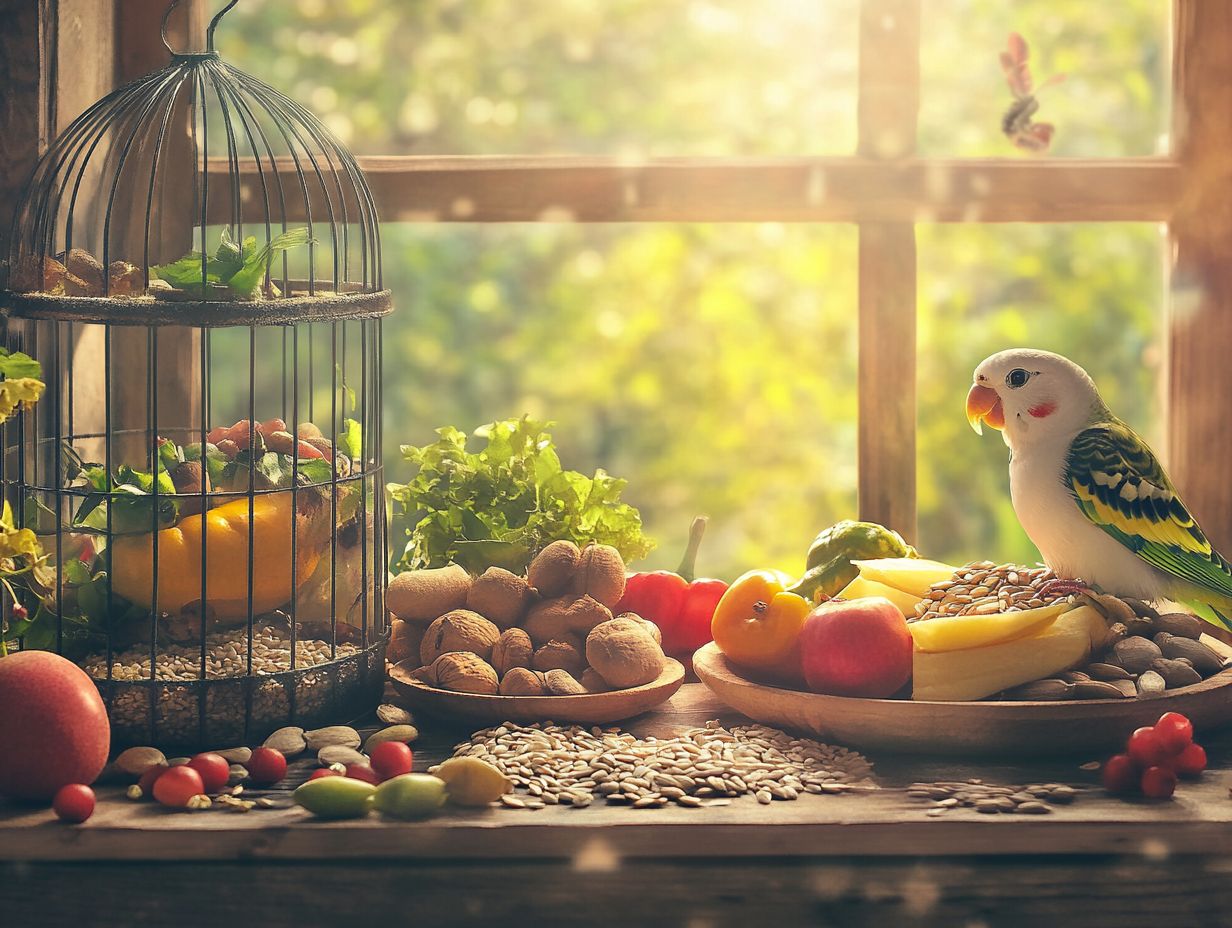
What are the 5 best feeding practices for pet birds?
- Provide a varied diet.
- Offer fresh foods daily.
- Monitor portion sizes.
- Provide clean water.
- Avoid harmful foods.
Why is it important to provide a varied diet for pet birds?
A varied diet ensures that pet birds receive all the necessary nutrients for optimal health. It also prevents boredom and encourages foraging behaviors.
Start implementing these feeding practices today to ensure your bird’s health!
How often should fresh foods be offered to pet birds?
Every day, treat your pet bird to fresh fruits and veggies! They love it, and it keeps them healthy.
Why is it necessary to monitor portion sizes for pet birds?
Keep an eye on how much your bird eats. This helps prevent overeating and keeps them fit.
What type of clean water should be provided for pet birds?
Make sure your bird has clean, fresh water at all times! Change it daily to keep them safe and healthy.
Which foods should be avoided when feeding pet birds?
Stay away from foods like avocado, chocolate, caffeine, and alcohol. These can be toxic and harmful to your feathered friend.

